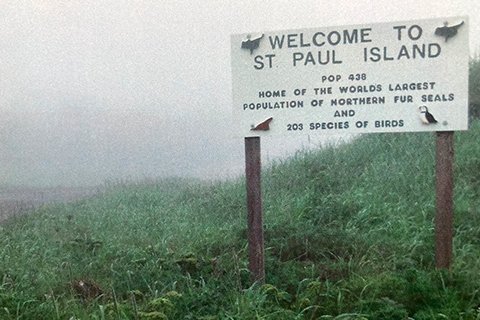Tipping the iceberg: Leveraging a food transition for indigenous communities in the Bering Sea

A team of researchers from Utrecht University and the Aleut community of St. Paul is working on a project to leverage a food system transition for the indigenous community on the Pribilof Islands in the Bering Sea. The project is funded by the Complex Systems Fund and located at the Centre for Complex Systems Studies.
As the world becomes more interlinked, humanity is facing ever more complex challenges. Solutions to these problems are increasingly difficult to identify, and conventional strategies fail to do so. Traditional approaches are refacing sustainability issues but do not lead to sustainable systems. Tackling these interlinked problems demands us to move beyond isolated disciplinary research and towards problem-driven, transdisciplinary approaches. Arctic indigenous food systems are often tightly interlinked, involve multiple scales and actors and therefore, must be studied as complex adaptive social-ecological systems. Many Arctic indigenous food systems are also experiencing a fundamental, undesired and unsustainable shift.
Using complexity science in transdisciplinary research
The project adopts a complex systems perspective to identify leverage points in the marine-based Arctic indigenous food system on the Pribilof Islands. The researchers take a highly participatory approach and establish a Transformation Lab on St. Paul and St. George Island that involves and empowers community members to identify transformation pathways towards a sustainable future. To gain a systemic understanding of the food system's current structure, they construct a multiple-layer social-ecological network model and analyze interdependencies between key actors of the system and prevailing sustainability issues. The team then combines natural and social sciences and explores how the food system is influenced by changes in people's values and paradigms from the past until today. St. Paul and St. George Island share a unique history during which external forces profoundly disrupted their food system multiple times. These incisive events have changed deep system characteristics, and their legacy still has a determining influence on the system today. In close collaboration with the community, the scientists will develop positive scenarios of the future food system and pathways towards a more sustainable system state. These pathways are then tested using agent-based modelling to capture the system's dynamics and inform the community's actual interventions.
The project aims to gain a holistic understanding of the social-ecological system to identify interdependencies and feedbacks between humans and nature and find key leverage points for sustainability transformation. Thus, the project provides a unique opportunity to assess whether complex systems science combined with transdisciplinary approaches can lead to actual changes on the ground.

